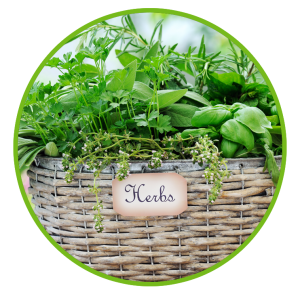Herbs

RECOMMENDATION
Herbs can be used fresh and raw for maximum benefit in salads and juices or cooked in curries, stews or soups (For maximum flavour, add them at the end of cooking) or dried and added to your meals to add depth of flavour.
Try setting up a small area in your home and grow your own herbs so they are always fresh and available when you need them.
Always thoroughly wash your herbs if they are not organic to ensure you remove any pesticides.
Why Herbs are good for us
CONSUME EVERYDAY
Fresh herbs not only add a depth of flavour to the meals we eat, but they also contain a multitude of antioxidants and healing properties.
Some herbs such as oregano, marjoram, mint, thyme, basil and parsley contain carvacrol which has been proven to be beneficial in treating prostate cancers. Some studies have also found that oregano oil has the ability to selectively kill cancer cells while leaving healthy cells intact.
Many herbs have strong antimicrobial properties and may work as a natural disinfectant, stopping the spread of cancer cells.
Basil is an excellent dietary source of the carotenoid lutein, a compound that has been found to help reduce the risk of breast cancer in several epidemiological studies. Basil also contains numerous volatile compounds with powerful antioxidants, antimicrobial, anti-inflammatory, and antifungal properties.
A study carried out in Portugal found that extracts of thyme might protect people from colon cancer. They also found that wild thyme caused cell destruction in breast cancer cells. Thymol is a naturally occurring compound known as a biocide. Thymol has been shown to destroy harmful organisms, such as infectious bacteria and when used alongside other biocides, such as carvacrol, thyme has strong antimicrobial properties.
Studies have shown parsley may help to neutralize or reduce the effects of certain carcinogens, such as second-hand smoke. It also contains apigenin, a natural oil which has been linked to anti-angiogenesis, which is the reduction of blood vessel growth that supplies cancerous tumors with nutrients. Stopping the pathways for tumours will slow or even reverse growth.
Animal and test-tube studies have demonstrated that sage may fight certain types of cancer, including those of the mouth, colon, liver, cervix, breast, skin and kidney. People who regularly use sage as a spice seem to have a 54% lower chance of developing lung cancer compared to those who don’t. It’s high in antioxidants and may help support oral health, aid brain function and lower both blood sugar and cholesterol levels.
